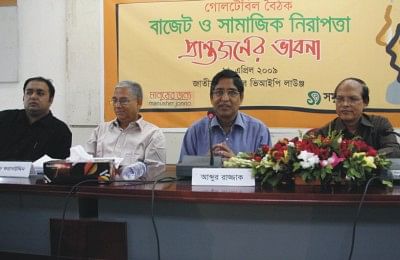100-day job programme now under redesign to detect weaknesses

Food and Disaster Management Minister Dr Abdur Razzaque speaks at a pre-budget discussion, organised by Unnayan Samunnay and Manusher Jonno Foundation in Dhaka yesterday.Photo: STAR
Food and Disaster Management Minister Dr Abdur Razzaque has said the government is redesigning the 100-day employment generation programme to identify its weaknesses.
“We did not cancel the programme. We are just redesigning it to bring corruption at the lowest level, if not eliminated fully,” the minister told a pre-budget discussion on “Budget and social safety net programmes: Prospective of the marginalised” at the National Press Club in the capital yesterday.
“We've decided not to continue the programme this fiscal year as different quarters came up with sharp criticism,” Razzaque said
The programme with some changes would be introduced from the next fiscal year.
Unnayan Samunnay and Manusher Jonno Foundation jointly organised the discussion, with Dr Atiur Rahman in the chair.
Former governor of Bangladesh Bank Dr Mohammad Farashuddin and Dr KAS Murshid, director of Bangladesh Institute of Development Studies (BIDS), and Dr Jafrullah Chowdhury, founder of GonoShasthaya Kendra, also spoke.
The minister came down heavily on the past BNP government for not enhancing the development budget as per the needs of the people.
He said the annual development programme outlay had not increased in line with the inflationary pressures of the past several years.
Discussants at the programme asked the government to introduce a special or emergency fund to deal with the situation stemming from the changing global and domestic economic conditions.
“An emergency fund is necessary,” said KAS Murshid, which was supported by Atiur Rahman and Farashuddin.
Murshid said the global financial crisis is hurting the farmers badly because of a drastic fall in the prices of their produces.
Farashuddin urged the government to increase allocation for agriculture and water resources, which he believes would help reduce poverty.
Atiur Rahman and AK Iftekharul Haque presented a paper on social safety net at the programme.
The paper said although Bangladesh made a significant progress in poverty reduction over the past 15 years, the number of hardcore poor people increased from 2.49 crore to 2.7 crore between 2000 and 2005. It said safety net programmes could play a key role in protecting this large proportion of people.

 For all latest news, follow The Daily Star's Google News channel.
For all latest news, follow The Daily Star's Google News channel. 



Comments